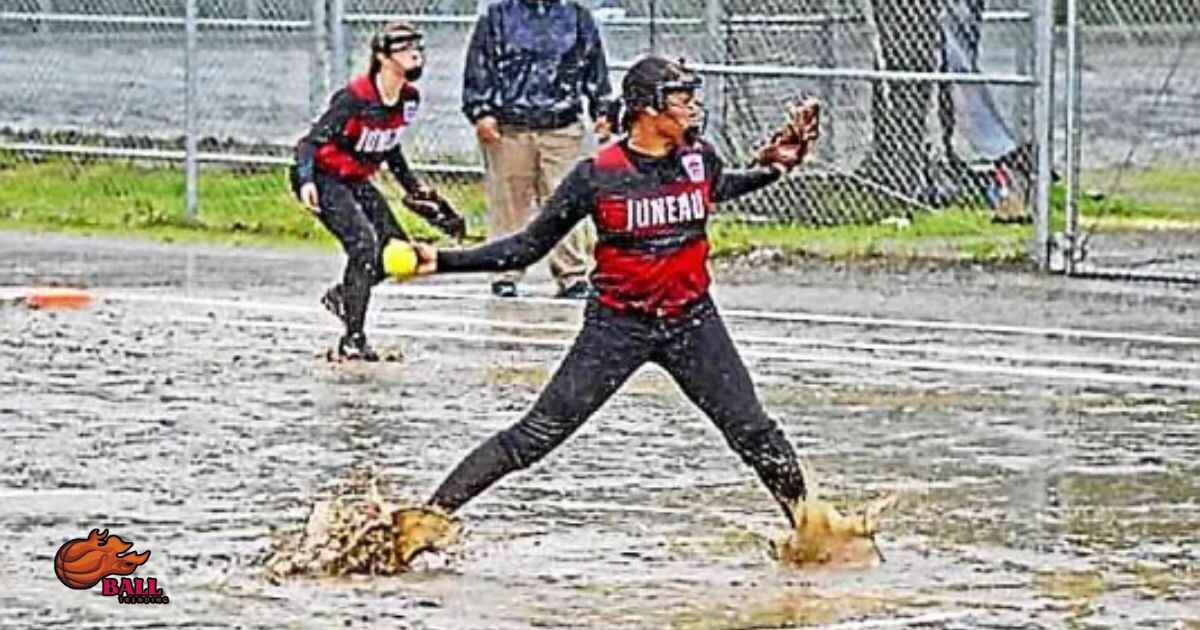Softball, a beloved sport that fosters camaraderie and competition, often faces the challenge of inclement weather. Players and fans alike eagerly anticipate the opportunity to participate in the game they love, even when faced with rainy conditions. However, can softball be played in the rain? This question arises frequently among enthusiasts seeking to maintain their involvement in the sport.
In this article, we will explore the various aspects surrounding playing softball in the rain. From the risks and necessary precautions, to the impact on gameplay and field maintenance, we aim to provide a comprehensive guide for those seeking to navigate wet conditions. So, join us as we unravel the mysteries and possibilities of playing softball in the rain, ensuring your continued passion for the game remains undeterred.
Key Takeaways
- Softball can be played in the rain, but there are risks and precautions that need to be taken into consideration.
- Proper equipment, such as waterproof clothing and shoes, is necessary for rainy softball games to keep players dry.
- Rain delay rules ensure the safety of players and fair play, and games may be postponed or canceled if conditions become unsafe.
- During a rain delay, activities can be organized to keep players engaged and foster team unity and development.
Risks Of Playing Softball In Rain
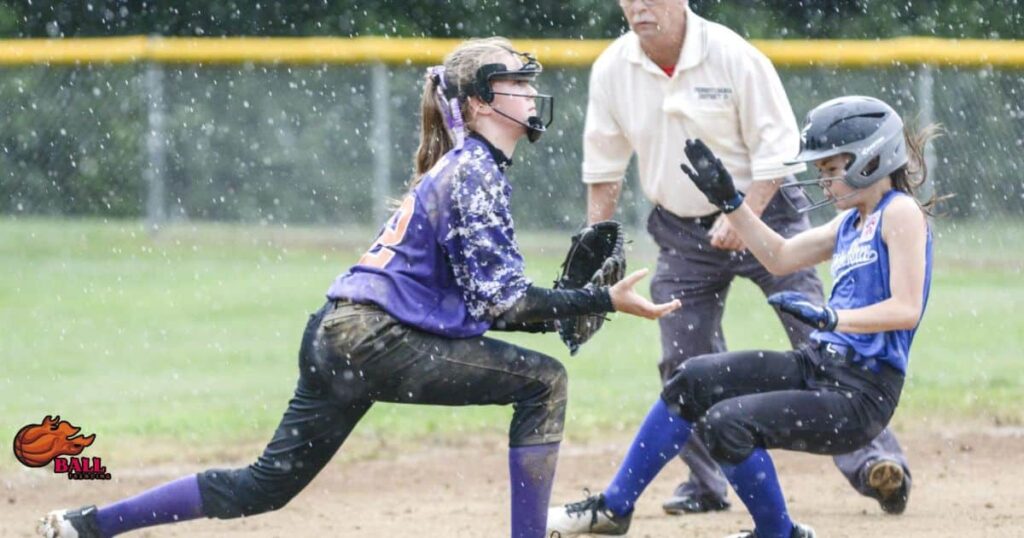
Playing softball in the rain carries several risks due to the increased likelihood of slippery conditions and decreased visibility. The wet playing surface can pose a significant threat to players’ safety, as it becomes challenging to maintain balance and control over one’s movements. Slipping and falling not only increases the risk of minor injuries like sprains and strains but also raises the potential for more severe harm such as fractures or concussions.
The rain can impact visibility, making it difficult for players to track the ball’s trajectory and judge its speed accurately. This can lead to misjudgment and result in missed catches or collisions between players. Therefore, it is crucial for players and organizers to prioritize safety and consider postponing or rescheduling games when weather conditions pose a risk to players’ well-being.
Preparing For Wet Softball Conditions
To ensure safety and optimal playing conditions, it is essential to adequately prepare for wet softball conditions. Playing softball in the rain can present challenges, but with the right preparations, it is still possible to have a successful game. First and foremost, it is crucial to have the appropriate gear, such as waterproof shoes and clothing, to keep players dry and comfortable. Additionally, the field should be properly maintained to prevent excessive water accumulation and ensure proper drainage.
Clearing any debris or puddles from the field before the game is essential. Moreover, players should be educated on how to adjust their gameplay in wet conditions, such as being cautious of slippery surfaces and adjusting their throwing and catching techniques. By taking these precautions, players can enjoy a safe and enjoyable game of softball even in wet conditions.
Necessary Equipment For Rainy Softball Games
Proper equipment is essential for playing softball in rainy conditions, ensuring the safety and comfort of players. When it comes to rainy softball games, there are a few key pieces of equipment that players should have. First and foremost, waterproof or water-resistant clothing is crucial to keep players dry and prevent discomfort. This includes a waterproof jacket and pants, as well as waterproof socks and shoes to keep feet dry.
Players should consider wearing a hat or visor to shield their eyes from rain and maintain visibility. It is also important to have a good quality grip-enhancing spray or powder to ensure a strong hold on the bat and prevent slips. Lastly, having a waterproof bag or carrying case to protect valuable equipment such as gloves, balls, and bats is essential. With the right equipment, players can enjoy a rainy softball game while staying safe and comfortable.
Softball Rain Delay Rules
During inclement weather, when softball games are being played in the rain, it is important to understand the rain delay rules that govern the continuation or suspension of the game. Softball rain delay rules are in place to ensure the safety of players and maintain fair play. When rain becomes heavy or lightning is detected, umpires may decide to halt the game and call for a rain delay. The duration of the delay can vary depending on the severity of the weather conditions.
Once the rain subsides and the field is deemed playable, the game can resume. However, if the weather does not improve or becomes worse, the game may be postponed or canceled. It is crucial for players, coaches, and spectators to follow the instructions of the umpires and comply with the rain delay rules to ensure the well-being of everyone involved.
Causes Of Rain Delays In Softball
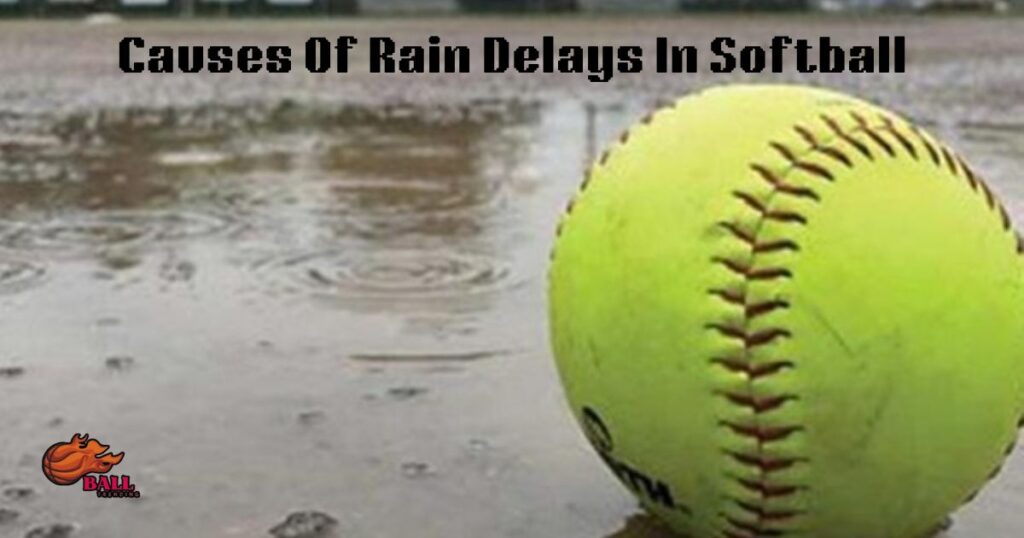
One common cause of rain delays in softball is heavy rainfall. When it rains heavily, the field becomes wet and slippery, making it dangerous for players to run, slide, or make sudden movements. This can increase the risk of injuries, such as sprained ankles or pulled muscles. Additionally, heavy rainfall can also affect the visibility of the players, making it difficult for them to see the ball or judge its trajectory accurately.
Moreover, a wet ball becomes heavier and harder to grip, which can affect the accuracy of throws and pitches. To ensure the safety of the players and maintain the integrity of the game, rain delays are necessary in such weather conditions. It allows time for the rain to subside and the field to be properly prepared before the game can continue.
Activities During A Rain Delay
To ensure the safety of the players and maintain the integrity of the game, various activities can be organized during a rain delay in softball. When rain interrupts a game, it is important to keep the players engaged and entertained while they wait for the weather to improve. One popular activity during a rain delay is team bonding exercises. This can include team building games, such as trust falls and group challenges, to foster a sense of unity and camaraderie among the players.
Coaches and team managers can use this time to provide educational sessions, discussing game strategies, analyzing opponents, or reviewing past performances. These activities not only help players stay focused and connected, but also contribute to their overall development as athletes.
Postponement Of Softball Games
Softball games may be postponed due to inclement weather. When rain or other severe weather conditions make playing conditions unsafe or impractical, game organizers have to make the difficult decision to postpone the game. This can be disappointing for both players and fans, but it is necessary to prioritize the safety and integrity of the game.
To help understand the factors that contribute to a game being postponed, here is a table outlining some common reasons for game postponement:
| Factors | Explanation | Example |
|---|---|---|
| Heavy rain | Creates slippery field conditions | Puddles form on the field |
| Lightning | Safety hazard due to risk of lightning | Thunderstorms in the area |
| Flooding | Field becomes unplayable due to excess water | Nearby river overflows |
Official Stand On Softball And Rain
The official stand on playing softball in the rain is determined by various factors and considerations. The safety of the players is of utmost importance, and playing in wet conditions can increase the risk of injuries such as slips and falls. Additionally, rain can affect the playing field, making it slippery and potentially hazardous.
Therefore, most official softball leagues and organizations have rules and guidelines in place regarding playing in the rain. These rules often state that games should be postponed or canceled if there is heavy rain or if the playing conditions are deemed unsafe. The decision to play in the rain ultimately lies with the league officials and umpires, who carefully assess the conditions and prioritize the well-being of the players.
Player Safety In Wet Conditions
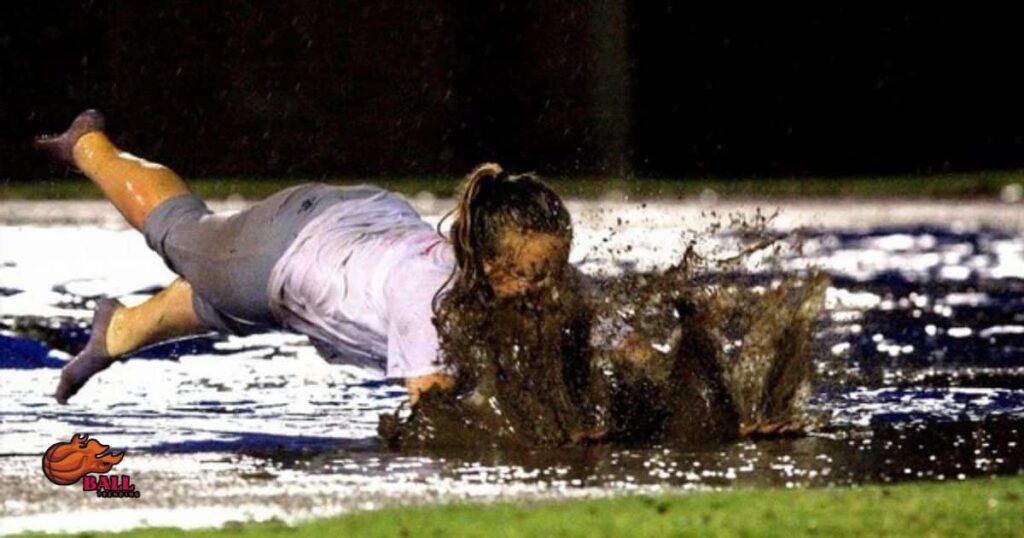
Player safety is a paramount concern when considering the implications of wet conditions during a softball game. Wet conditions can increase the risk of slips, falls, and injuries. Here are four key factors to consider for player safety in wet conditions:
- Proper footwear: Players should wear cleats with good traction to prevent slipping on wet surfaces.
- Field conditions: The field should be properly maintained to minimize puddles and ensure good drainage.
- Communication: Players need to communicate with each other and be aware of their surroundings to avoid collisions or accidents.
- Equipment maintenance: Wet conditions can affect the grip on bats and balls, so it’s essential to keep them dry and in good condition.
Assessing Game Conditions: Umpire’s Perspective
How does the umpire assess game conditions during wet weather? Ensuring fair play and player safety are paramount concerns for umpires in any softball game, and this becomes even more crucial when the weather turns wet. Umpires must assess the field conditions and make informed judgments about whether it is safe and feasible to continue the game. Here is a table outlining the factors that umpires consider when assessing game conditions during wet weather:
| Factor | Assessment |
|---|---|
| Field Surface | Is the field wet, muddy, or waterlogged? |
| Player Safety | Are players at risk of slipping or getting injured? |
| Ball Visibility | Can the ball be seen clearly by players and umpires? |
| Game Continuity | Will the game be significantly affected by the rain? |
Effect Of Rain On Softball Gameplay
When rain is present, the effect on softball gameplay can be significant. The wet conditions can have both positive and negative impacts on the game. Here are four ways in which rain affects softball gameplay:
- Slippery field: Rain makes the field wet, causing the ground to become slippery. This can lead to players losing their footing, affecting their ability to field, throw, and run.
- Reduced visibility: Rainfall can reduce visibility, making it difficult for players to track the ball. This can result in misjudged catches, leading to errors and scoring opportunities for the opposing team.
- Altered ball movement: Wet conditions can change the way the ball moves through the air and off the bat. Pitchers may find it challenging to maintain control and accuracy, while batters may struggle to make solid contact.
- Delayed or canceled games: In severe cases, heavy rain can cause games to be delayed or even canceled due to safety concerns. This can disrupt schedules and impact team performance.
Understanding the effects of rain on softball gameplay is crucial for players, coaches, and officials to adapt their strategies and ensure a fair and safe playing environment.
Field Maintenance In Wet Weather
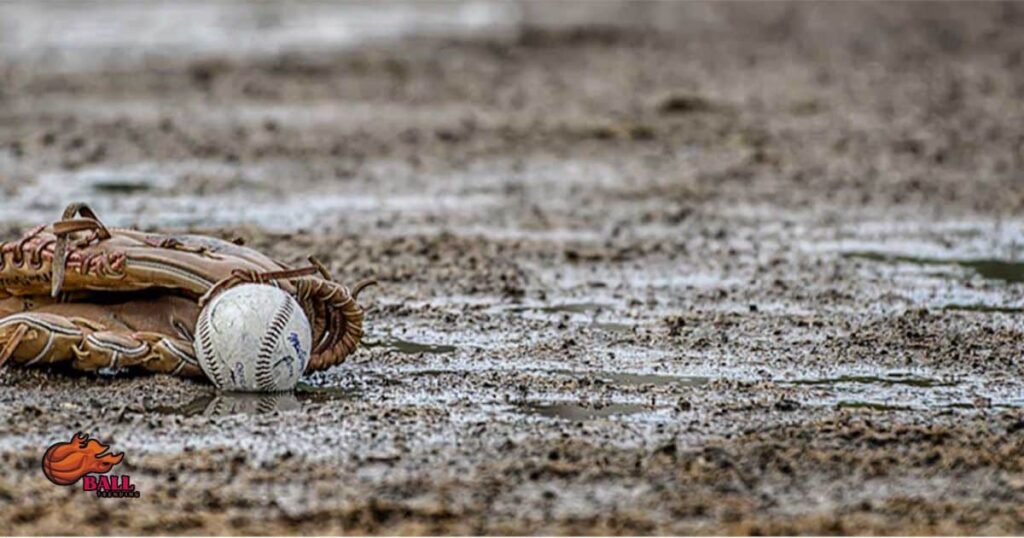
Field maintenance in wet weather is essential for ensuring safe and playable conditions for softball games. When rain falls, the field can become slippery and muddy, making it difficult for players to run, slide, and make quick movements. To combat these challenges, field maintenance crews must take certain measures to prepare the field before and during wet weather conditions.
One important step is to ensure proper drainage on the field. This can be achieved through the installation of a drainage system or by regularly aerating the soil to allow water to seep through. Additionally, maintaining the field’s turf is crucial. Regular mowing, fertilizing, and reseeding help to prevent excessive water retention and promote healthy grass growth.
To provide more insight into field maintenance in wet weather, here is a table outlining some key tasks and considerations:
| Task | Description | Importance |
|---|---|---|
| Clearing debris | Removing fallen leaves, branches, and other debris from the field to prevent clogging of drains and potential hazards for players. | High |
| Covering the field | Using tarps or covers to protect the field from excessive rain and minimize damage to the playing surface. | Medium |
| Monitoring weather forecasts | Staying updated on weather conditions to anticipate rain events and take necessary precautions in advance. | High |
Conclusion
In conclusion, playing softball in the rain poses risks to both players and the quality of gameplay. However, with proper preparation and equipment, games can still be played in wet conditions. Rain delays are common in softball, and umpires play a crucial role in assessing game conditions for player safety. Interestingly, a study found that rain delays can last an average of 57 minutes in professional softball games, highlighting the impact of weather on this sport.
